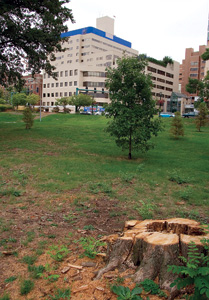 Lionel Sobehart
Lionel SobehartThe extended lease on part of Forest Park requested by Barnes-Jewish Hospital has led to a public outcry from residents throughout St. Louis.
The land leased by Barnes-Jewish Hospital, known as Hudlin Park, currently encompasses 9.4 acres of Forest Park and houses an underground parking complex for the University. With the extension of the lease, the hospital would be able to build more on this land. BJC healthcare, which is affiliated with the hospital, and St. Louis officials have tentatively agreed to this extension.
This proposal, however, has been met with vast opposition. Dr. William Landau, professor of neurology at the Washington University School of Medicine, thinks that there are plenty of older buildings that the hospital already owns that can be knocked down and rebuilt.
Landau said, “There is ample room for redesign and restructuring without having to steal land from the park. Park land can not be disposed of or prostituted.”
June Fowler, vice president of corporate and public communications for BJC Healthcare, thinks the construction is absolutely necessary.
“We need more hospital beds to meet the needs of the aging baby boom population,” said Fowler. “Unlike other large metropolitan areas, the city of St. Louis does not have a public hospital. We are the only hospital in the city limits that still delivers babies.hospitals are not like other [buildings]. [You] cannot tear down a hospital to build another hospital. Beds are already being used, so you have to build the new ones first.”
With the existing lease proposal, BJC pays $180,000 a year, which does not include permission to build. With the new lease proposal, the hospital would pay $1.6 million a year. In hopes of appeasing some of the opposition, all of the $1.6 million would be donated to the park for maintenance and upkeep.
BJC has also agreed to maintain 10 percent of open space in the new building complexes.
With these concessions, Fowler insists that everyone will win with the new deal. “Lease payments we make would replace what money is being put into Forest Park, and [this money] could be put towards other parks. It is a win for Barnes- Jewish, a win for Forest Park, and a win for the citizens of St. Louis,” said Fowler.
Landau, however, believes that other options should be explored before using parkland. Carla Scissors-Cohen, one of the leaders of the Citizens to Protect Forest Park campaign, agrees with Landau. Scissors-Cohen thinks the lease actually denotes the sale of parkland.
“[They are] putting up a building on the section and leas[ing] it for 90 years. Any time something is changed this dramatically, it is really the same as a sale. Parkland will cease to be parkland.”
Scissors-Cohen explained that the deal that BJC and the city made, infringed on the Forest Park Master Plan, which was put into action in the 1990’s to improve and protect park space. One of the principles was no net loss of green space. For example, if a road needed to be moved to another space, its former spot would be covered with greenery after it moved to its new location.
When BJC submitted a proposal to extend its lease for the purpose of building, the Forest Park Advisory Board voted to amend this plan.
“The vote was not unanimous, and it disturbed me that it was able to be changed so quickly,” said Scissors-Cohen.
Scissors-Cohen related that in 1973, the city gave the hospital permission to build the underground parking garage in exchange for improving the land.
“They want to break that promise made to citizens that they would maintain this section of Forest Park as parkland. [I] do not think citizens voted to put up a building.”
Scissors-Cohen thinks that the city underestimated the citizen’s concerns when they tentatively decided to let BJC extend its lease. Instead, she believes that St. Louis residents should determine the issue. She also fears that a precedent will be set, leading to other businesses thinking that they have license to build in Forest Park.
“Hilltop campus might be running out of room,” said Scissors-Cohen. “What if Washington University wants to build a dorm on Skinker? It is not a risk I think we should take. [Those decisions] should be up to the citizens, not to the folks at City Hall.”
Scissors-Cohen said that the current solution, to use lease money to maintain the park, is “short-sighted and simplistic”.
“What happens in thirty years when we need more money? Are we going to slice off more land until there is none left? We need to come up with a solution for funding that does not put the park at risk.”
She and members of her campaign are working to introduce a future proposal that would keep the city from selling, leasing, donating or disposing of any parkland without the vote of residents. The initiative currently has 5,000 out of 22,000 needed signatures.
In the end, Scissors-Cohen remains undeterred. “When [the proposal] appeared in the paper, it seemed like a done deal,” said Scissors-Cohen. “Our message is that this is not a done deal. We do have a voice, and we can affect change.”